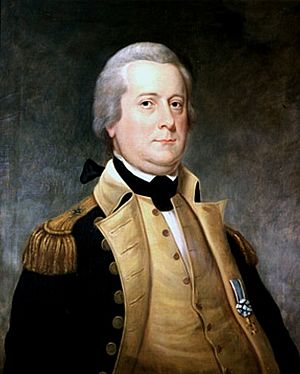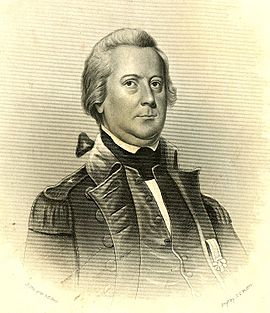William Irvine (general) facts for kids
Quick facts for kids
William Irvine
|
|
|---|---|
 |
|
| Member of the U.S. House of Representatives from Pennsylvania's at-large district |
|
| In office March 4, 1793 – March 3, 1795 |
|
| Preceded by | None |
| Succeeded by | None |
| Personal details | |
| Born | November 3, 1741 Enniskillen, County Fermanagh, Kingdom of Ireland |
| Died | July 29, 1804 (aged 62) Philadelphia, Pennsylvania, U.S. |
| Political party | Anti-Administration |
| Signature | |
| Military service | |
| Allegiance | |
| Branch/service | |
| Rank | |
| Battles/wars | American Revolutionary War |
William Irvine (born November 3, 1741 – died July 29, 1804) was an important person in early American history. He was born in Ireland but became an American doctor, soldier, and leader from Carlisle, Pennsylvania.
Before the American Revolutionary War, he worked as a doctor on a British ship. But when the American colonies wanted to be free from British rule, Irvine decided to support the Americans. He fought against the British as a general in the Continental Army. After the war, he continued to serve his country. He was part of the Continental Congress and helped stop the Whiskey Rebellion in Pennsylvania. He also served in the U.S. Congress for Pennsylvania and was involved in many other public activities in his state.
Contents
Early Life and Family
William Irvine was born in 1741 in a place called Enniskillen, in County Fermanagh, Ireland. His family was Scots-Irish and Presbyterian. He went to Trinity College Dublin to study medicine and old literature. His teacher, Doctor George Cleghorn, said he was a very good doctor.
After college, Irvine worked as a ship's doctor on a British warship during the French and Indian War. In 1763, he moved to the American colonies and settled in Carlisle, Pennsylvania. He quickly became involved in local politics. In 1772, he married Ann Callender. Her father was a well-known person in Carlisle.
Irvine had two brothers who also helped in the war. Andrew was an officer in the Continental Army, and Matthew was a doctor and surgeon. William's first son, Callender, was born in 1774. He became an army captain and later managed his father's land. His second son, William, and youngest son, Armstrong, both fought in the War of 1812. William Irvine often wrote letters to his wife and children, even when he was away fighting.
Fighting in the American Revolution
William Irvine became a brigadier general in the Continental Army during the American Revolutionary War. He worked closely with General George Washington, sending him many letters. Irvine also represented Pennsylvania in the Continental Congress from 1787 to 1788, and later in the United States House of Representatives from 1793 to 1795.
In January 1776, he was made a colonel and helped create the 6th Pennsylvania Regiment. However, on June 16, 1776, he was captured by the British in Canada during the Battle of Trois-Rivières. He was held as a prisoner until May 1778. In May 1779, he was promoted to brigadier general and took command of the 2nd Pennsylvania Regiment. He arrived in Pittsburgh in November of that year.
Commanding the Western Army
On September 25, 1781, Congress ordered Irvine to lead the Western Department of the Continental Army. His headquarters were at Fort Pitt. Even though the main fighting of the war ended in the east with the British surrender at Yorktown, the conflict continued on the western frontier.
Irvine learned that American settlers in the west wanted the army to attack Detroit. They believed the British there were helping Native American groups fight against the Americans. On December 2, 1781, Irvine wrote to General Washington. He explained that to stop the attacks, they needed to either defeat the Native Americans or drive the British out of Detroit. He thought destroying Detroit would help bring peace to the area.
Washington agreed with Irvine. Irvine then sent Washington a plan in February 1782 to capture Detroit with about 2,000 men. He also convinced Colonel William Crawford to lead a mission against Native American villages along the Sandusky River. This mission ended sadly with Crawford's death.
When Irvine took command at Fort Pitt, he found the fort in very bad shape. He wrote to Washington on December 2, 1781, saying the soldiers looked "deplorable" and "despicable." He also said the fort was falling apart from floods. Irvine suggested building a new fort nearby that would be easier to defend. However, Congress did not have enough money and turned down his idea. Washington wrote back, saying he understood the problems but that the decision to move the fort was up to Congress.
In 1786, Irvine became a member of the Continental Congress. He was chosen to help settle the money accounts between the U.S. Government and the different states.
Later Public Service
Irvine was elected to the U.S. House of Representatives for Pennsylvania. He served from December 2, 1793, to March 3, 1795.
In 1797, he was sent to Pennsylvania to help solve problems during the Whiskey Rebellion. This was a protest by farmers against a tax on whiskey. When he couldn't solve it peacefully, he was put in charge of the militia troops. He then helped bring an end to the rebellion.
Irvine stayed active in Pennsylvania's public life. He helped manage the distribution of land given to war veterans. He also served on a board that settled financial issues between the states and the new federal government. In the 1790s, he played a big part in surveying land and planning towns in western Pennsylvania.
Family Land and Business
Irvine bought land near the Brokenstraw Creek and the Allegheny River. He gave some of this land to his son, Callender. This area later grew into the town of Warren, Pennsylvania. Callender Irvine built a store and a house there. This estate, called "Brokenstraw," became the family's home and business center for many years. Callender's son, Dr. William A. Irvine, expanded the family business to include an iron foundry, a saw mill, a woolen mill, and even oil wells.
In September 1790, Irvine started a business with John and Charles Wilkens of Pittsburgh. They bought and sold goods like flour and whiskey, mostly in the Ohio and Mississippi Valleys.
Final Military Service
In the late 1790s, Irvine took on a military role one last time. This was during another tax protest called the Fries's Rebellion. This rebellion happened because the government put a new tax on houses to pay for military improvements. Some people rebelled and even imprisoned tax collectors. President Adams ordered troops to stop the rebellion. Irvine joined the soldiers marching to Quakertown. He felt old for the task, but he completed it safely. This was his last active military service. In 1801, he was put in charge of military supplies in Philadelphia.
In 1801, Irvine was elected president of the State Society of the Cincinnati. This was a group for officers who fought in the Revolutionary War. He held this position until he died.
William Irvine passed away on July 29, 1804, in Philadelphia, Pennsylvania. He was first buried near Independence Hall. Later, his remains were moved to Ronaldson's Cemetery. In the 1950s, his grave and those of other Revolutionary War officers were moved again to the Gloria Dei Church cemetery.
Irvine's Papers
Most of William Irvine's letters and other important papers were passed down to his sons. His son William kept many of the letters sent to Irvine. The letters Irvine wrote himself are found in different places, including among the Washington Papers. Irvine's letters from the early 1790s also talk about Dickinson College, improving river travel in Pennsylvania, and his business with Charles and John Wilkins. Many of his letters are kept at the Historical Society of Pennsylvania.
See also
- James Irvine (Pennsylvania politician)
 | Janet Taylor Pickett |
 | Synthia Saint James |
 | Howardena Pindell |
 | Faith Ringgold |


